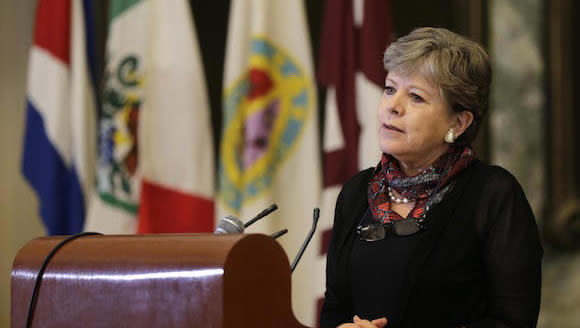Alicia Bárcena is Awarded an Honoris Causa Doctorate by the University of Havana
In her speech, the Executive Secretary of the Economic Commission for Latin America and the Caribbean (ECLAC) said that regional integration is destined to play a central role in the face of the current situation.

The Executive Secretary of the Economic Commission for Latin America and the Caribbean (ECLAC), Alicia Bárcena, was awarded an honoris causa doctorate in Economics by the University of Havana, where she pointed out that regional integration is destined to play a key role in the face of the current situation in Latin America and the Caribbean.
During the investiture ceremony, headed by Rector Gustavo Cobreiro, the United Nations senior representative said that this honorary title recognizes the role of hundreds of men and women who work every day for the development of rights, justice and equality in Latin America and the Caribbean at ECLAC, an organization she has run since July 2008.
In her speech at the ceremony, attended by representatives from the Government, members of the diplomatic corps and the United Nations system in Cuba, along with academics and students from the university, the Executive Secretary reviewed the international economic scenario, marked by weak aggregate demand, volatility in financial markets and the fall in the prices of commodities.
In the case of Latin America and the Caribbean, with a projected growth of 0.2% in 2016, the Executive Secretary referred to the drop of foreign direct investment flows, the decrease of exports and an increase in the current account deficit, among other factors affecting the region’s economic performance.
“Our countries are being especially affected by the cycles of growth and international liquidity due to its specialization in few low technology-intensive goods and scarce capacity to diversify their exports,” she explained.
“The social aspect is not only played in the social sphere. If we do not manage to move towards a more sophisticated and knowledge-intensive productive and export structure, we remain subject to the fluctuations of the prices of commodities. And, in this scenario, it is very difficult to uphold the valuable progress achieved in recent years for the reduction of poverty and inequality,” ECLAC’s most senior representative said.
Alicia Bárcena also underscored that the challenge of aligning development trajectories with goals within the 2030 Agenda for Sustainable Development demands action in three areas: international governance for the production of global public goods; cooperation and regional contribution to the world’s debate; and national public policies, especially the ones related to the macroeconomic, social, industrial and environmental areas.
The list of personalities awarded with an honoris causa doctorate by the University of Havana, founded in 1728, includes, among others, Alfonso Reyes, Jaime Torres Bodet, Nicolás Guillén, Eduardo Galeano, Mario Benedetti, Rafael Alberti and Alejo Carpentier.
This ceremony took place on Thursday, March 24 in the framework of a three-day visit to Cuba, in which ECLAC’s Executive Secretary was accompanied by Raúl García-Buchaca, Deputy Executive Secretary for Administration and Programme Planning, and the Director of ECLAC’s subregional headquarters in Mexico, Hugo Beteta.
On Thursday, the Executive Secretary was also received by the President of Cuba Raúl Castro, who was accompanied by the Ministers of Foreign Affairs, Bruno Rodríguez, and of Foreign Trade and Foreign Investment, Rodrigo Malmierca. During the meeting, Bárcena expressed ECLAC’s willingness to continue accompanying the updating process of the Cuban economic model.
Additionally, during her stay in Havana, the Executive Secretary held bilateral meetings with the First Vice President of the Council of the State of Cuba Miguel Díaz-Canel, as well as with the Minister of Economy and Planning Marino Murillo; and the Minister of Labor and Social Security Margarita González.
Alicia Bárcena also met with the President of Cuba’s Central Bank Ernesto Medina, and the Director of the National Statistics Office and Information (ONEI) Damar Maceo. On Friday 25, she was also expected to meet the Minister of Finance and Prices Lina Pedraza, and the United Nations Resident Coordinator in Cuba Myrta Koulard.
Country(ies)
- Cuba
Subregional headquarter(s) and office(s)
Subregional Headquarters, MexicoRelated link(s)
Contact
Public Information Unit
- prensa@cepal.org
- (56 2) 2210 2040